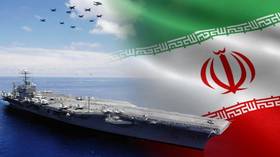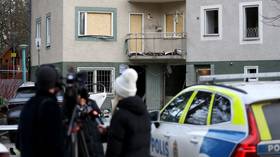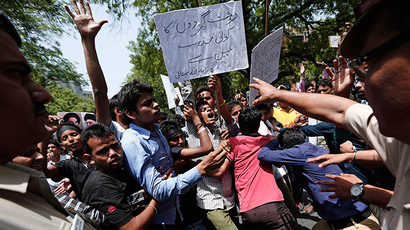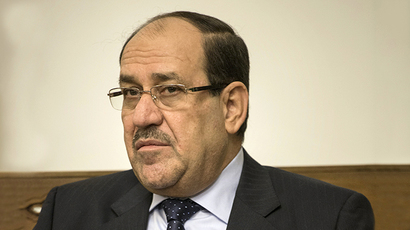Iraqi troops push back ISIS militants in Tikrit as PM under pressure to quit
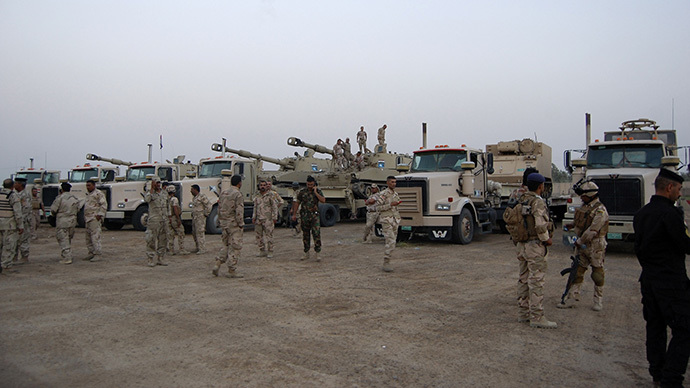
Iraqi government forces backed by helicopter gunships began an offensive on Saturday to retake Tikrit from Sunni Islamist militants, while party leaders pursued talks to end Prime Minister Nouri al-Maliki’s rule, which is seen as highly divisive.
Politicians in Baghdad and around the world have warned that as well as taking back cities captured by insurgents from the Islamic State of Iraq and the Levant (ISIS/ISIL), Iraqi authorities must quickly form a government that might be able to bring the country's split communities together.
Since the beginning of June, ISIS jihadists have overrun mainly
Sunni areas in the north and west of Iraq.
ISIS’ aim is to re-create a medieval-style caliphate stretching
from the Mediterranean to the Gulf. They believe that Shiite
Muslims are heretics that should be killed, and there is already
confirmation that they have staged mass executions of Shiite
government soldiers, as well as civilians captured in Tikrit.
On the battlefield, Iraqi troops have been advancing on Tikrit
from Samarra, and have stemmed the militant advance south towards
Baghdad.
Iraqi special forces air-dropped snipers inside Tikrit University
on Thursday, which had been taken over by ISIS fighters.
Helicopter gunships were used against other targets in the city
on Saturday, and ISIS fighters abandoned the main city
administration building.
A senior Iraqi official told AFP that his security forces were
coordinating with Washington, which has military advisors on the
ground to help push back the militants. There were also reports
of US drones flying over the city, the hometown of former
dictator Saddam Hussein.
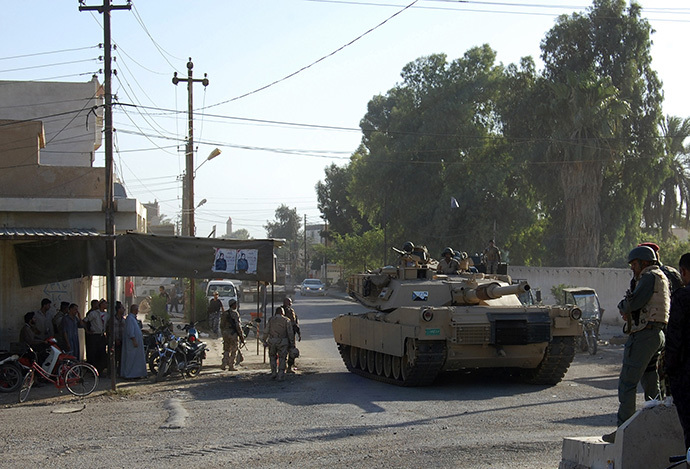
Qassim Atta, a spokesman for the Iraqi military, told reporters on Saturday that militant commanders are starting to struggle because “their morale has started to collapse.” He added that 29 terrorists were killed in Tikrit on Friday.
But in the south of the country, ISIS militants were on the offensive. In Jurf al-Sakhar – located 85 kilometers south of Baghdad – police sources said that 60 ISIS fighters and 15 Iraqi security forces were killed in an attack on an army camp, but the militants retreated when they could not hold their positions.
Political wrangling
Grand Ayatollah Ali Sistani, a powerful Shiite cleric, intervened
Friday and urged Iraq's political blocs to agree on a new
premier, parliament speaker, and president before the
newly-elected legislature meets in Baghdad on Tuesday.
Meanwhile, King Abdullah of Saudi Arabia promised US Secretary of
State John Kerry to use his influence to encourage Sunni Muslims
to throw their weight behind a new, more inclusive Iraqi
government, in an effort to undermine support for the Sunni
Islamist insurgents. The king’s words are a significant shift
from Riyadh’s unwillingness to support a new government unless
Maliki steps down, which may reflect his disquiet about the
regional implications of ISIS’ rise.
A Shiite lawmaker from the National Alliance, which groups all
Shiite Muslim parties, said that a session of the Alliance –
including Maliki’s State of Law party – would be held throughout
the weekend and that a number of Sunni political parties would
also meet later on Saturday.
“The next 72 hours are very important to come up with an
agreement to push the political process forward,” the
lawmaker, who asked to be kept anonymous, told Reuters.
Iraq’s Sunnis accuse Maliki of pushing them aside and repressing
their community, which has led many armed Sunni tribes to support
the hardline ISIS insurgency.
The president of Iraq’s autonomous Kurdistan region has also said
that Maliki should go. Maliki’s party won the most seats in the
April election and was pushing for a third term before the ISIS
offensive began. Now, some senior officials in his party say
there is a possibility of him being replaced.
“It’s a card game and State of Law plays a poker game very
well. For the Prime Minster, it will go down to the wire,”
one official told Reuters.
Meanwhile, on the Iraq-Syria border, other Islamist rebels have
challenged ISIS’ grip on power and have launched a
counter-offensive on the border town of Albu Kamal.



